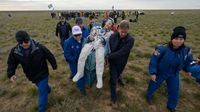NASA astronaut Don Pettit, at the remarkable age of 70, has just completed a 220-day mission aboard the International Space Station (ISS), making him the oldest active astronaut in NASA's history. His journey came to a successful conclusion on April 20, 2025, when he splashed down in Kazakhstan after an extensive scientific mission.
Pettit, who embarked on this seven-month-long mission aboard the Roscosmos Soyuz MS-26 spacecraft on September 11, 2024, was accompanied by Russian cosmonauts Alexey Ovchinin and Ivan Vagner. Together, they orbited the Earth over 3,520 times, conducting experiments and contributing to the ongoing research at the ISS.
Upon their return, NASA confirmed that Pettit was doing well, stating, "Pettit is doing well and in the range of what is expected for him following return to Earth." The agency conducted routine post-landing medical checks in Karaganda, Kazakhstan, before he boarded a NASA plane destined for the Johnson Space Center in Houston.
Before his return, Pettit and his crewmates handed over command of the ISS to Japanese astronaut Takuya Onishi, marking a smooth transition in leadership on the station.
Born in Oregon on April 20, 1955, Pettit has a rich background in science. He holds a degree in chemical engineering from Oregon State University and a doctorate in the same field from the University of Arizona. Prior to becoming an astronaut, he worked as a staff scientist at the Los Alamos National Laboratory in New Mexico. Pettit was selected as a NASA astronaut in 1996, and since then, he has participated in four spaceflights.
Pettit's first venture into space was in 2003 as part of Expedition 6, where he spent over five-and-a-half months aboard the ISS. His subsequent missions included a 16-day trip in 2008 to expand the living quarters of the ISS and a year-long stay during Expeditions 30 and 31 in 2012. In total, he has logged more than 590 days in space and has completed at least 13 hours of spacewalks, known as extravehicular activities (EVAs).
Despite his age, Pettit's contributions to space exploration are significant. He is the second-oldest person to have ever reached orbit, following the late John Glenn, who made a historic return to space at the age of 77 in 1998. Pettit’s achievements are a testament to the capabilities and resilience of older astronauts, inspiring future generations to consider careers in space science and exploration.
As the world continues to watch advancements in space exploration, Pettit's mission underscores the importance of scientific research conducted in microgravity. The ISS serves as a platform for international collaboration, where astronauts from various countries work together to expand our understanding of life in space.
With each mission, astronauts like Pettit not only push the boundaries of human endurance but also contribute to vital research that could benefit life on Earth. As he returns to his life on the ground, Pettit’s legacy will undoubtedly inspire others to reach for the stars, regardless of age.


